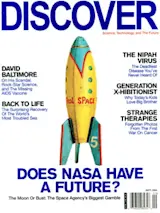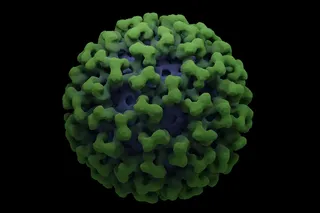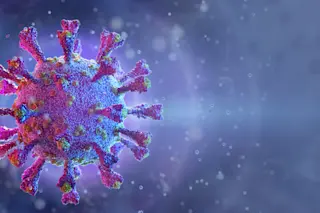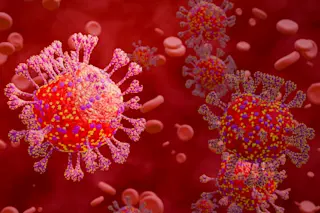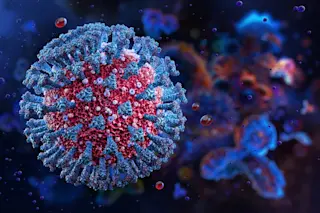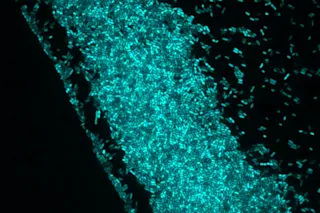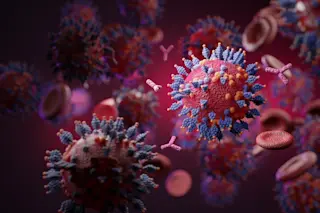In molecular biology David Baltimore is a giant. September 1 marks the last day of his presidency at Caltech, and although he will continue to work as a professor, it is the end of an era in a long career that has been as controversial as it has been impressive. For more than a quarter of a century, Baltimore has balanced his long hours as a leading scientific administrator—founder of the seminal Whitehead Institute, president of Rockefeller University and later, for nine years, of Caltech—with groundbreaking work in cancer, immunology, and AIDS research.
Baltimore won the Nobel Prize in 1975 for his surprising discovery that RNA can be transformed into DNA, a process in cells known as reverse transcription. No one then could have predicted the role this discovery would play when a strange new illness began popping up in emergency rooms in 1981. The pathogen responsible, HIV, was found to reproduce using reverse transcriptase (thus it is a retrovirus), and Baltimore has been in the trenches of AIDS research ever since. The oft-quoted biologist has railed against the Bush administration's handling of science and is on the panel that decides how money will be spent on stem cell research in California, via the state's controversial Proposition 71.
But as great as his accomplishments are, Baltimore is perhaps best known for his involvement in one of science's most famous scandals, the so-called Baltimore affair. In 1986 Thereza Imanishi-Kari was accused of fraud when a postdoc questioned the results of published research that Imanishi-Kari had coauthored with Baltimore. The accusations were addressed by Congress, which concluded that data may have been falsified. An appeal to a federally appointed panel led to an exoneration, but Baltimore's vehement insistence that his colleague was innocent in the face of damning evidence led to his resignation as president of Rockefeller University.
Discover caught up with Baltimore on his final presidential vacation at his second home near Missoula, Montana, where his plans to fly-fish were interrupted by our questions about the future of AIDS prevention, the usefulness of stem cell research, and what really happened in the most famous fraud scandal prior to this year's South Korean stem cell debacle.
Why did you decide to step down as president?
I decided that I had done as much as I could and that it was a good time for a new person to take over. I had said it would be about 10 years when I started off. It was 9 years, and that felt just right.
This year marks the 25th anniversary of the first known case of AIDS. Is AIDS research, a quarter century later, where it should be?
AIDS research today suffers a lot from our inability to figure out a route to make a vaccine. The research in the treatment of the disease has gone very well, but what the less-developed world needs, and what we need, too, is a vaccine. Because of the biology of HIV, it has been extremely difficult to make such a vaccine—and it's not for lack of smart ideas. But the virus always seems to figure out a way around anything that we come up with. We're going to live in a world without an HIV vaccine for at least another decade, at the rate we're going. And we've been saying it's going to be another decade for the last few decades. So it's a very depressing circumstance.
What makes HIV so challenging to a biologist?
The virus has found ways to protect itself—particularly against antibodies—almost completely. It hides in a cloud of sugar—carbohydrates—and it has only a few open spaces on its surface that are not covered in sugar. Those open spaces are so designed that the body finds it difficult to make an antibody that will be able to get in there and block the receptor sites that the virus uses to bind the cell. The end result is that this is one of those very rare diseases—there's hardly another like it—where the virus multiplies continuously at high levels and the immune system is unable to deal with it. What vaccines depend on is the immune system. We know that the standard vaccine simply won't work, and so we have to look for novel ways of making vaccines. But so far no one's come up with an answer.
Is it possible that no one will ever be able to develop a vaccine?
I'm not positive it will be found. This may be a disease that we simply can't vaccinate against. And if you look at the other diseases we can't vaccinate against, they are the major killers in the world—malaria and tuberculosis in particular. We may live in a world where our only protection is educating people to protect themselves.
What kind of AIDS research are you conducting in your lab?
I have a very strange and chancy program in the AIDS area that is funded by the Gates Foundation. We want to use gene therapy methods to protect people against HIV. It is a way to modify cells in the immune system. We use viruses that have been gutted of all their viral genes and use them as vectors. The absent genes are replaced with ones that control the immune system specificity. And then we infect bone marrow cells with the vector—those cells ultimately give rise to the immune system. The vector incorporates itself into the DNA of the cell. Then we put those transformed cells back into an animal or, ultimately, a person. The immune system will be programmed by the genetic changes that we've made. It will now make protective molecules [antibodies and antibody-like proteins] that it otherwise would not make. This would be something that initially would be a therapy after infection, but if it worked, then I'd like to see it developed as a vaccine, if that were at all possible.
Has anybody ever done anything like this—used gene therapy to modify the immune system?
No, only in experimental animals. We've had a lot of success with them. We were working with a cancer model to work out the system. We've also done work in protecting human cells against HIV infection using gene therapy methods. That's in vitro.
Since you are on the panel that oversees the California money for stem cell research, could you compare the controversy over stem cells to past controversies, like IVF? That clearly blew over, and IVF became mainstream. In vitro fertilization was shocking when it first came along, and there was a lot of opposition to it. The United States government has never funded a program for in vitro fertilization. IVF has developed as a totally unregulated industry without a good scientific base because the government was afraid to touch it. So although you are right in saying that everybody's doing it, it's a hospital-based procedure that is unregulated. I don't know what the quality of it is. But a lot of children are being born that way. I think it's absolutely terrific.
But if IVF is unregulated, could there be problems in the long term because nobody is looking at this scientifically?
Absolutely, there could be. Who knows?
So, having seen the IVF controversy, the stem cell controversy was no surprise.
We were sensitized to the fact that stem cells were going to be touchy territory. What was a surprise was that the president of the United States would block the development of a whole field of science as a consequence. If the Democrats get in, or certain Republicans get in, it will change overnight.
And you think at that point the typical American won't even question this science?
That's what I think. Right.
How is the California money being spent?
There is no money being distributed. The whole initiative depends on the issuance of bonds, and the opposition has prevented the bonds from being issued by bringing legal challenges. During a time of uncertainty and with legal challenges ongoing, you can't sell bonds. So the amount of money being given out is quite small. The California initiative was supported by private philanthropists, and so there was some money there. They've given out grants for training purposes to a number of institutions in California. But that's the only money that's been given out. The rest of the time we've spent getting procedures in place and dealing with the bureaucratic issues of setting up this huge funding operation for science, which the state of California never had.
If there had not been a controversy, what do you imagine we'd be able to do right now with stem cells?
I really don't know, because I don't know how hard it's going to be to solve some of the problems. There are fundamental problems. The South Korean debacle [in which scientist Hwang Woo Suk was found to have been conducting fraudulent stem cell research] was revealing because one of the basic technologies that we thought they had developed they were in fact unable to do, and so far nobody in the United States or elsewhere has been able to do it either.
So, like AIDS, is it possible that perhaps 25 years from now we will still be at the beginning, solving the most basic problems?
Yes, but the difference is that there are pretty obviously enormous opportunities for doing good science with stem cells. And whether it becomes therapeutically extremely important or not, I don't know. But I have no doubt that it will be scientifically very important.
What kind of science will we get from them, if not therapeutic?
The major thing we can learn from stem cells is how a program unfolds that leads from an undifferentiated cell to a highly differentiated cell. And we've learned a lot about that in model systems, such as in fruit flies, worms, and mice. But the opportunity to do that with humans is, of course, very limited. To start with human stem cells will be a powerful way to understand what goes on in the development of human physiology. And when development goes wrong, as it does with many diseases, we can study that outside the body.
You are unafraid to say what you feel. What motivates you?
If we scientists want our community to have the respect that it's due, we have to be open and honest. And if we start playing games and being politicians, then we lose one of the most valuable things that we have, which is our honesty. It doesn't mean we're always right. But it does mean that we're willing to stand by what we believe.
As president of Harvard University, was Larry Summers too outspoken?
Well, if you're talking about what he said about women in science, I think he should have kept that for a purely academic discussion—if he wanted to have an academic discussion about it—and not have done it in circumstances in which it could become public.
Should he have resigned?
I don't think Larry had to resign because of what he said about women. He had lost the confidence of the faculty, and it's very difficult to lead a faculty if they don't have confidence in you.
You had to resign from the presidency of Rockefeller University after only one year because of the fraud scandal. Was that unfair?
It was unfair that it had to happen, but it was not wrong given the circumstances. It had become very difficult for me to function. The chief executive has to have the ability and authority to function.
During your own controversy, you stated that scientists should be trusted and not questioned. Considering all the recent fraud scandals, do you think differently about those statements?
I still feel that the vast majority of scientists are honest about what they do and that fraud is rare. Unfortunately, it has recently happened in very visible circumstances. But science has to be replicated. In the instances in which there is fraud, it will be found out if it is important. If it's not important, then it doesn't matter.
Is there anything you would have done differently in your own case?
There are some things, but I don't particularly want to get into them.
Why did it happen in the first place?
It was the kind of laboratory dispute that occurs, and it just got blown totally out of proportion.
Wasn't there any justification for an accusation of fraud?
I don't even think that it was justified that it got started. I mean, the science was perfectly good. The problem was a personnel problem in a lab, and those kinds of things happen. The problem was that it got out of the lab and into the National Institutes of Health and into Congress.
You're saying that there weren't errors and sloppy work?
There was sloppiness in record keeping. That used to be much more of a problem than it is today, because people are more aware of the need for it today. But in the old days many people took notes on a paper towel, and that's just not acceptable behavior anymore.
Was her work ever replicated?
You know, it's never been exactly replicated to my knowledge. Things very much like it have been done, and there's no reason to doubt that what she saw is correct. As far as I know, the research was completely solid.
In the case of Hwang Woo Suk, being a superstar scientist may have put pressure on him to continually accomplish great things. Are scientists in the United States under pressure to be superstars within their own field?
That's a dangerous pressure in science because it does lead people to cut corners. I don't know that it happens, but it's something to be concerned about. When people become very visible, they may act to try to keep their reputation.
You are a Nobel laureate and something of a science superstar in your field. How do you deal with that?
I try to ignore it as much as possible [laughs]. It's hard with students who see me as somebody who has both been in research for a long time and been quite successful, so I've got to break that down.
Do you think that the popular conception that you are scientifically set for life once you have a Nobel is something of a myth?
Yes, it is absolutely a myth. I know that funding agencies look very carefully at you when you have a Nobel Prize. In fact, they worry that you're over the hill in some way and just trying to coast on a reputation, so they look perhaps even more carefully at proposals from Nobel laureates. There is no open spigot of funds available.
What was the most enjoyable part of your career?
You know, every time I'm involved in an experiment—whether a student of mine is doing it or in the old days when I would do it myself—where there's an unexpected, exciting result, it's just the same thrill all over again. We had some pretty exciting stuff recently, and it's the same thrill. You go home, and you think about it when you go to sleep, and you think about it when you wake up in the morning, and you know there is something new in the world.
Will you ever really retire?
Who knows? Depends what gets me first, right?



